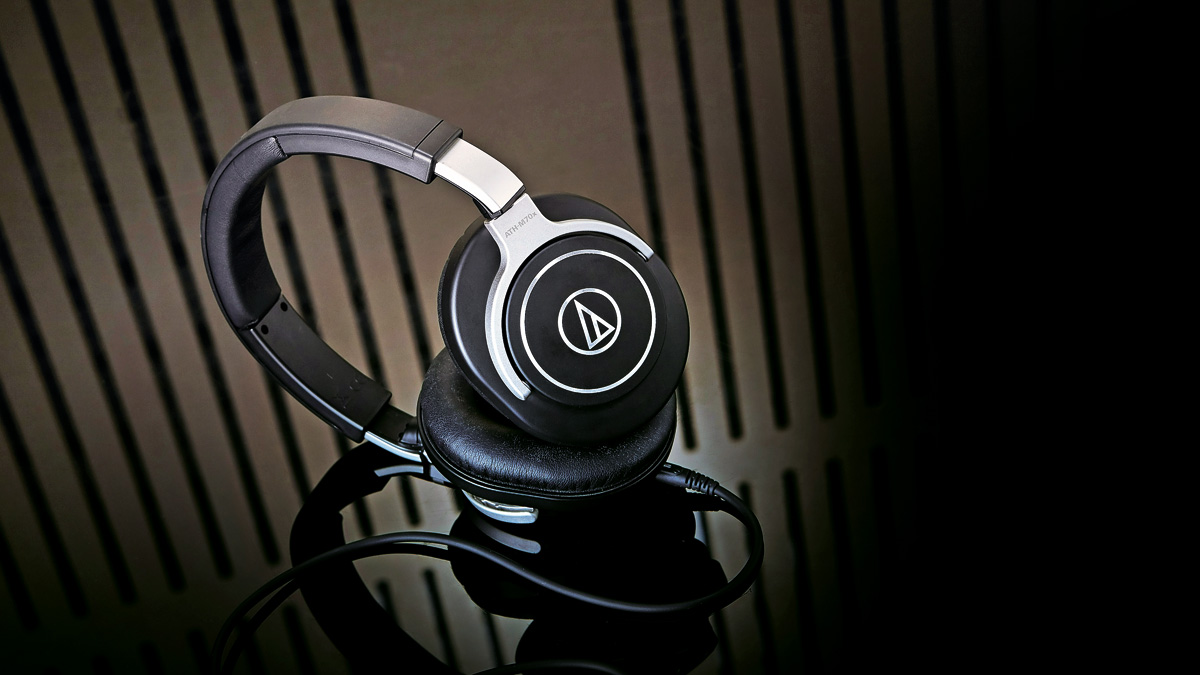MusicRadar Verdict
A comfortable design that has the power and durability to meet the demands of performers and DJs.
Pros
- +
Solid build.
Cons
- -
Not suited for mixing/tracking. Expensive.
MusicRadar's got your back
The flagship new model of Audio-Technica's M series builds on the ever popular M50 (now M50x).
The M70x is aimed at a wide range of monitoring uses, but with 90o swivelling circumaural (over ear) ear pads, low impedance, high power handling and closed backed design, noisy environments (eg DJ booth, studio floor tracking) and 'one-ear-off' usage are a primary focus.
Though light, the M70x are a robust design that feel like they can take a beating. The ear cups feature comfy soft leather type pads that just about cover the ear, and the isolation level is good enough for most uses, except maybe rock drumming.
The weight/comfort combination does make the M70x suitable for lengthy periods of immersion, but of course the sound will dictate whether you'd want to.
Our first aural impression of the M70x is of a forward mid frequency range. This focus appears across the octaves flanking 3kHz, dipping down towards 7kHz, which is good as that's an area we don't want pushed up any more than necessary.
This mid curvature could also be expressed as a lighter low-end and un-hyped high-end.
Some headphones, especially circumaural closed back types, suffer from an overabundance of bass, which sucks the life out of a sound field, making it hard to zone in on any of the important parts (ie the mids); in this respect the mid focus of the M70x is a good thing.
Want all the hottest music and gear news, reviews, deals, features and more, direct to your inbox? Sign up here.
Our concern is that it is easier to overcook the low-end without noticing, though any distortion added to low frequency components will quickly be exposed in the upper harmonics.
In the DJ environment this is no bad thing as there is plenty of bass in the room, so there's no point wasting power pumping a load of bottom-end into the cans.
With 2W max input power (at 1kHz) there's plenty of power handling available, producing SPLs we can only wince at. At full tilt on my studio headphone amp distortion is barely noticeable, though with full bandwidth transducers the earliest component to distort is the bass (larger diaphragmatic excursions); so again, lighter bass equals more 'loudness'.
In the studio we would prefer the M70x for performance over mixing duties. The former use requires a good balance of physical comfort, power, durability, and sensitivity in the mid frequencies, where most intelligibility and rhythmic/transient information resides.
In this regard the M70x ticks all the boxes, though a bass player may want to stand close to their amp.
On the other side of the glass we'd tend to undermix the mids, and thus over-emphasise the LF and HF ranges, creating a scooped inverse of the M70x response.
Unwanted mid range components and artefacts do stick out a mile through the M70x, so many relative imbalances in this critical range are easy to identify and work on, but we find the low-end trickier to balance without reference to main monitors.
The high-end is smooth despite it tapering off more than we are used to, and with no over-presence in the sibilant range any ear fatigue will develop a lot slower than under many other headphones.
The frequency response also appears to produce a narrower stereo image than we'd expect, and this may be due to a reduced central anchoring effect from the low frequency range, which rarely pans out to the sides. As with all listening-based judgments, subjectivity is king and after some time with the M70x my ears/brain adjusted, normalising our perception in relation to the main monitors we know intimately.
These are not cheap headphones and face plenty of competition at this price and below. Their build guarantees they will last, and if you don't use the included carry case they can pack down easily thanks to the swivelling ear cups.
For performance and DJ use we think these are well worth considering, but we have our reservations in the studio tracking/mixing situation.
